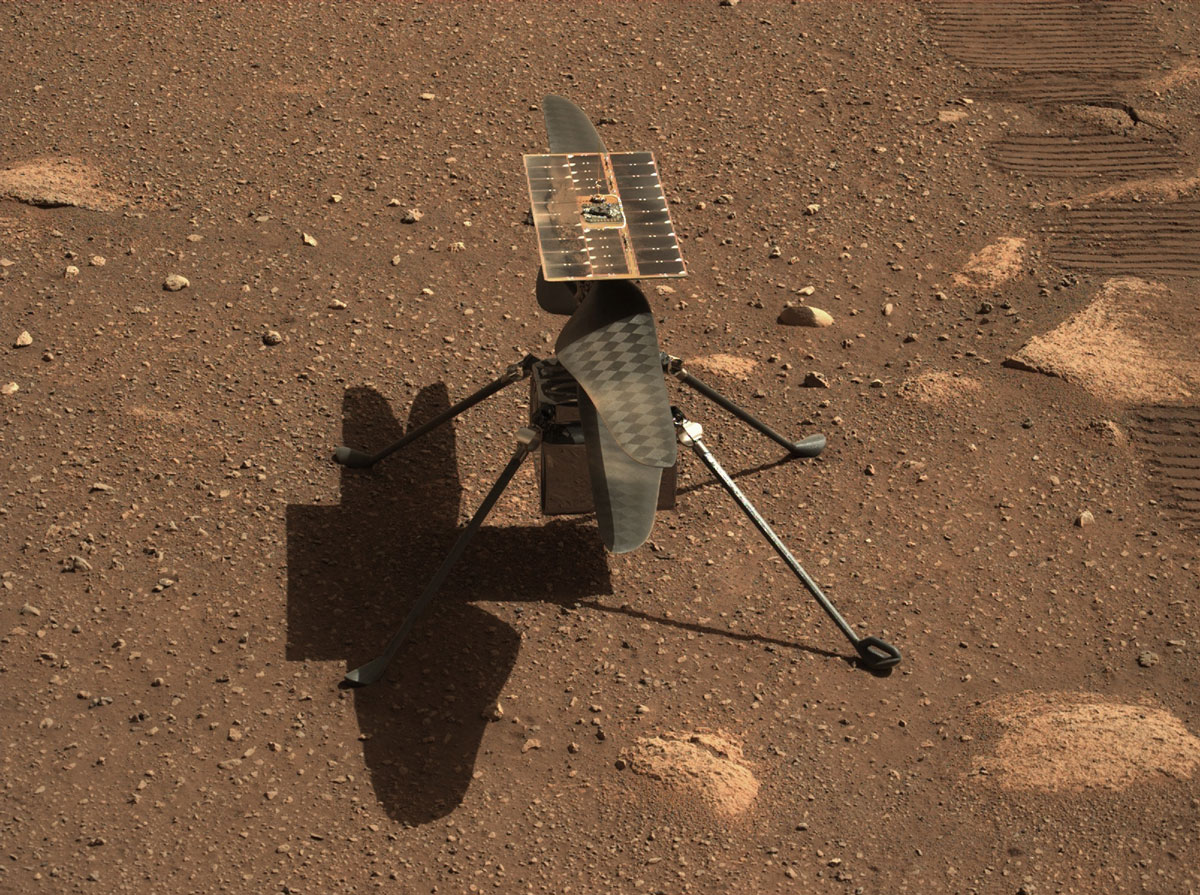NASA’s Ingenuity helicopter on Mars has exceeded everyone’s expectations, recently completing its 51st flight when it was supposed to fly just a few times as a demonstration mission. But flights 50 and 51 almost didn’t happen.
In a recent blog post, Travis Brown, Chief Engineer for Ingenuity shared how the team lost contact with the tiny rotorcraft for six excruciating days.
At first, they were not overly concerned when communications ceased from the helicopter on Sol 755. About a year ago, a brief two-day communication glitch occurred because Ingenuity experienced insufficient battery charge as night fell at the start of the Martian winter. This reduced voltage reset the mission clock, causing the helicopter’s system to be out of sync with Perseverance rover. While the team quickly figured out the issue, because of Ingenuity’s off-the shelf batteries, they expected this issue could happen again.
But now, this time was different.
“In more than 700 sols operating the helicopter on Mars, not once had we ever experienced a total radio blackout,” Brown wrote. “Even in the worst communications environments, we had always seen some indication of activity.”
But now, there was nothing. The team began to worry that they might not hear from the helicopter again.
Finally, on Sol 761, nearly a week after the first missed check-in, the communications team observed a single, lonely radio ACK (radio acknowledgement). The next day another single ACK confirmed the helicopter was indeed alive, a welcome relief for the team. After some forensics, Brown and his team thinks they have determined what happened.

“Ultimately, this first-of-its-kind communications blackout was a result of two factors,” said Brown. “First, the topology between the rover and the helicopter was very challenging for the radio used by Ingenuity. In addition, … a moderate ridge located just to the southeast of the Flight 49 landing site separated the helicopter from the rover’s operational area. The impact of this ridge would only abate once the rover had gotten uncomfortably close to the helicopter.”
Second, the communications antenna on the rover that ‘talks’ to the helicopter is located on the right side of the rover, and its position meant the signals between the two robots was partially blocked.
Now that Ingenuity is back, the team realizes future communication glitches are likely to happen. While it has far exceeded its nominal mission and its surprisingly hardy off-the shelf equipment keeps on ticking, the aging equipment and dusty conditions mean the helicopter won’t last forever.
“When we first flew, we thought we would be incredibly lucky to eke out five flights,” said Teddy Tzanetos, Ingenuity team lead at JPL. “We have exceeded our expected cumulative flight time since our technology demonstration wrapped by 1,250% and expected distance flown by 2,214%.”

Somehow the helicopter keeps on powering through all the adversity. Even on its 49th flight on Mars, the Guidance Navigation and Control team managed to push the flight envelope with a 16-meter vertical popup at the end of the flight, Brown said. At the peak of its flight, Ingenuity snapped the highest suborbital picture taken of the Martian surface its ever taken.
In addition to its primary mission as a technology demonstrator, Ingenuity has proved incredibly useful for the rover, providing tactical and scientific scouting for Perseverance mission. Ingenuity’s aerial imaging has proven its worth in helping the rover avoid potential rocky or sandy hazards.
But more ‘brown outs’ will likely occur and communications will likely come and go. When the end does come, both Ingenuity’s and Perseverance’s teams will miss the plucky little helicopter.
“Despite the imminent return of Martian summer, it now appears that the dust covering our solar panel will ensure that Ingenuity will likely remain in this transitional power state for some time,” Brown said. “This means that, much to the chagrin of her team, we are not yet done playing this high-stakes game of hide and seek with the playful little helicopter.”


Ingenuity, the little copter that could.